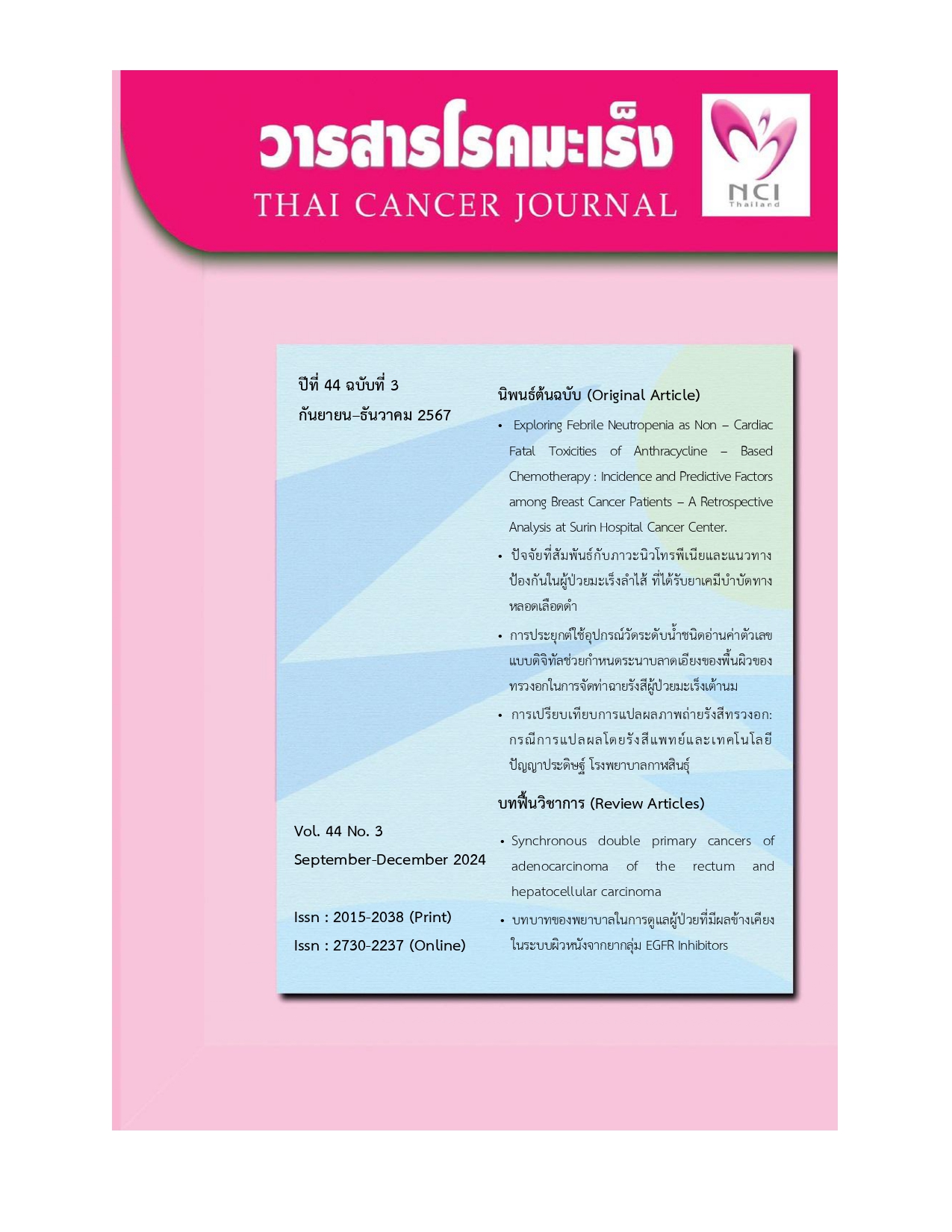Risk factors associated neutropenia and prevention strategies in colorectal cancer patients undergoing chemotherapy
Keywords:
neutropenia, colon cancer, chemotherapyAbstract
Neutropenia is a common adverse effect in patients undergoing chemotherapy, leading to treatment delays, prolonged therapy duration, and an increased risk of severe infections. This study aims to identify factors associated with neutropenia and develop preventive measures in colorectal cancer patients receiving intravenous chemotherapy. The study included 261 colorectal cancer patients receiving intravenous chemotherapy at the chemotherapy unit of Nan hospital from January 1, 2021, to April 30, 2024. Patient history data were collected from medical records and analyzed using descriptive statistics and logistic regression. The results indicated that 168 patients (64.37%) experienced neutropenia, with 128 patients (49.04%) having at least one episode of grade 2 or higher severity (ANC<1,500 cells/mm2). Factors significantly associated with grade 2 or higher neutropenia included female gender OR=2.47; 95%CI: 1.44-4.23; P=0.001), stage 3 cancer (OR=2.61; 95%CI: 1.18-5.72; P=0.017), FOLFOX4 chemotherapy regimen (OR=6.61; 95%CI: 1.27-34.47; P=0.025) The multidisciplinary team collaboratively developed preventive measures implemented in the unit. Proactive measures include dose reduction of chemotherapy or administration of G-CSF in female patients receiving FOLFOX4 regimens. Reactive measures involve educating and promoting appropriate self-care practices to prevent and reduce the risk of severe neutropenia. These strategies aim to enhance treatment efficacy and improve patients' quality of life
References
Caggiano V, Weiss RV, Rickert TS, Linde-Zwirble WT. Incidence, cost, and mortality of neutropenia hospitalization associated with chemotherapy. Cancer. 2005;103:1916-24.
Boccia R, Glaspy J, Crawford J, Aapro M. Chemotherapy-induced neutropenia and febrile neutropenia in the US: A beast of burden that needs to be tamed. Oncologist. 2022;27:625-36.
Ozer H. The timing of chemotherapy-induced neutropenia and its clinical and economic impact. Oncology (Williston Park). 2006;20:11-5.
Klastersky J, de Naurois J, Rolston K, Rapoport B, Maschmeyer G, Aapro M, et al. Management of febrile neutropaenia: ESMO clinical practice guidelines. Ann Oncol. 2016;27:v111-v8.
Lyman GH, Abella E, Pettengell R. Risk factors for febrile neutropenia among patients with cancer receiving chemotherapy: A systematic review. Crit Rev Oncol Hematol. 2014;90:190-9.
National Cancer Instutite. Cancer in Thailand 2016-2018. Bangkok: Misnitry of Public Health; 2020.
Jasperson KW, Tuohy TM, Neklason DW, Burt RW. Hereditary and familial colon cancer. Gastroenterology. 2010;138:2044-58.
Giovannucci E. Modifiable risk factors for colon cancer. Gastroenterol Clin North Am. 2002;31:925-43.
สำนักงานหลักประกันสุขภาพแห่งชาติ. แนวทางการขอรับค่าบริการสาธารณสุข กรณีโรคมะเร็งในผู้ใหญ่ ปี พ.ศ. 2566. นนทบุรี: สำนักงานหลักประกันสุขภาพแห่งชาติ; 2566.
Crawford J, Dale DC, Lyman GH. Chemotherapy-induced neutropenia. Cancer. 2004;100: 228-37.
Abdel-Razaq W, Almutairi F, Alzahrani MA, Albassam E, Alobedy FF, Alshehri AM, et al. Risk factors of chemotherapy-induced neutropenia associated with FOLFOX, FOLFIRI, and FOLFOXIRI regimens used in patients with advanced and metastatic colorectal cancer. Int J Med Res Health Sci. 2019;8:129-36.
S. Kanokkanya SB. Factors predicting neutropenia among patients with cancer receiving FOLFOX 4 chemotherapy regimen. Journal of nursing science & health. 2021;44:17-28.
Adamo V, Antonuzzo L, Danova M, De Laurentiis M, Marchetti P, Pinto C, et al. Supportive therapies in the prevention of chemotherapy-induced febrile neutropenia and appropriate use of granulocyte colony-stimulating factors: a Delphi consensus statement. Support Care Cancer. 2022;30:9877-88.
Citron ML, Berry DA, Cirrincione C, Hudis C, Winer EP, Gradishar WJ, et al. Randomized trial of dose-dense versus conventionally scheduled and sequential versus concurrent combination chemotherapy as postoperative adjuvant treatment of node-positive primary breast cancer: first report of Intergroup Trial C9741/Cancer and Leukemia Group B Trial 9741. J Clin Oncol. 2003;21:1431-9.
Özdemir BC, Csajka C, Dotto GP, Wagner AD. Sex differences in efficacy and toxicity of systemic treatments: An undervalued issue in the era of precision oncology. J Clin Oncol. 2018;36:2680-3.
André T, Boni C, Mounedji-Boudiaf L, Navarro M, Tabernero J, Hickish T, et al. Oxaliplatin, fluorouracil, and leucovorin as adjuvant treatment for colon cancer. N Engl J Med. 2004; 350:2343-51.
Hutchins LF, Unger JM, Crowley JJ, Coltman CA, Jr., Albain KS. Underrepresentation of patients 65 years of age or older in cancer-treatment trials. N Engl J Med. 1999;341:2061-7.
He X, Clarke SJ, McLachlan AJ. Clinical pharmacology of chemotherapy agents in older people with cancer. Curr Gerontol Geriatr Res. 2011;2011:628670.
Abdel-Rahman O. Effect of body mass index on 5-FU-based chemotherapy toxicity and efficacy among patients with metastatic colorectal cancer; A pooled analysis of 5 randomized trials. Clin Colorectal Cancer. 2019;18:e385-e93.
Alenzi EO, Kelley GA. The association of hyperglycemia and diabetes mellitus and the risk of chemotherapy-induced neutropenia among cancer patients: A systematic review with meta-analysis. J Diabetes Complications. 2017;31:267-72.
Downloads
Published
Issue
Section
License
Copyright (c) 2024 Thailand's National Cancer Institute Foundation

This work is licensed under a Creative Commons Attribution-NonCommercial-NoDerivatives 4.0 International License.
บทความทีตีพิมพ์ในวารสารโรคมะเร็งนี้ถือว่าเป็นลิขสิทธิ์ของมูลนิธิสถาบันมะเร็งแห่งชาติ และผลงานวิชาการหรือวิจัยของคณะผู้เขียน ไม่ใช่ความคิดเห็นของบรรณาธิการหรือผู้จัดทํา







